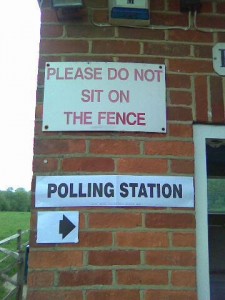9th May, 2010
I was worried that come the Friday after the election, I would wake up in a sea of ideological blue. A country gone comprehensively Conservative.
It was much worse than that.
The country had not gone blue. But I had.
Because now that we have a hung parliament, and the smoke-filled room shenanigans have begun (I take no pleasure in saying I told you so) I have been brought to a horrible realisation.
I am the only ‘progressive’ person in the UK who doesn’t believe in PR. I am alone with half a country’s worth of Tories. Or, let’s just cut to the chase: I am now a Tory.
I must be because every bone in my body hates this PR nonsense.
First of all, PR produces hung parliaments. It produces exactly the kind of undemocratic nonsense we are currently witnessing. Unlikely bedfellows negotiating in the Cabinet War rooms; exactly how much? Exactly what favour will that buy me? Soon they will book a room and make unholy alliance. God save us.
Do democrats REALLY want this the whole time? The voter, under any system – PR or not – has no say in these whoreish bargains.
 Anthony King, a professor of politics and ‘Constitutional Expert’ suggests in today’s Observer that we should be relaxed about coalitions. They happen in other countries. They happen INSIDE parties. So that’s all right then.
Anthony King, a professor of politics and ‘Constitutional Expert’ suggests in today’s Observer that we should be relaxed about coalitions. They happen in other countries. They happen INSIDE parties. So that’s all right then.
No. Coalitions inside parties are different. They are resolved ahead of an election. Compromises are formed, and manifestos drawn up. The big issues at least are agreed upon. And voted upon.
Coalitions after an election stink. Parties can ally with whomever they like, and trade whatever they like; the voter is a million miles away. This is not democracy in action.
I have argued elsewhere about the disproportionate power given to small parties by PR. I’m really bothered by it. But I don’t want to keep banging the same drum. And I have a suspicion that the coming weeks and months will reveal just how disproportionate and distasteful that power can be.
Pro-PR people are writing everywhere that now is the time; now is a unique chance in history to FORCE through PR. Interesting language for democrats.
Listen, I accept that PR was never going to be the choice of a majority Tory or even Labour government; to carry it off, the LibDems were always going to need a hung parliament and the disproportionate bargaining power that affords them. The trouble is, it is disproportionate. It is an abuse of power, and no democrat can feel comfortable with that.
Second, even if you like your parliaments well hung, PR systems are just rubbish. I really wonder how many of the proponents of electoral reform have actually read the Electoral Reform material?
Has the crowd currently clamouring for PR as if it would let us “take back parliament” – and cure cancer along the way – been to the ERS website?
If you haven’t, give it a whirl. There are tons of PR systems to choose from, but the favoured one is STV. Download the factsheet and weep. It’s boggling to understand. That should already ring alarm bells for any democrat. The demos ought to be able to understand how it confers its kratos, surely?
If you persevere with the STV factsheet and wade through the self-congratulation, you’ll see this.
1) WHEN IS A VOTE MORE THAN A VOTE? People who vote for a candidate with ‘more than enough’ votes get to choose more than just that candidate. Surplus votes get ‘redistributed’. Back a winner, and your second choice counts too. Ahead of everybody else. There’s value for you.
2) EXTREMISTS’ CHARTER People who vote for loonies and racists, take heart. Your second choice will count! Yes, your candidate, if he is last, will be thrown out. But fear not, your second choices will go right to the top of the pile, and be added to the tallies ahead of those cast by sane people for candidates ranking only in mid-table mediocrity.
Bonkers! Do free-thinking progressive types really want to dignify the second choices (not even the first choices!) of those who vote for loonies, nutters and racists?
And that’s not to mention the obvious disadvantages of PR, like losing the simplicity and accountability of ‘one constituency, one MP’. Ho ho, goes the argument: that simplicity was just for when we were illiterate and to continue with it patronises the modern voter. And that accountability was presumably for some long-forgotten time when MPs were corrupt and didn’t need the scrutiny and exposure of being the one MP responsible for a constituency. We’re better than that now.
STV’s devisers seem to be obsessed with maximising the number of voters who’ve ‘helped to elect’ MPs. This ‘helping to elect’ idea attaches undue importance to the second choices of the winning candidate – which is counter-intuitive. And, worse, it prioritises the second choices of those who vote for losing candidates. Which is just plain nutty.
I worry that this whole PR thing is a distraction from detailed policy debate; I think urging Clegg to exploit his position to drive PR through is, ironically – but grotesquely – undemocratic and no progressive thinker can be comfortable with such (ab)use of disproportionate power, no matter how badly they desire the end; the LibDems’ motivation will always be clouded by self-interest and sure, that’s not unique to the LibDems but then you can’t also dress up the promotion of a system which will benefit its proponents as fresh, clean politics.
Those of us who want values in politics ought to examine our own house. Armando Iannucci said he thought the public had had a good election. I’m coming to think he was wrong. We the public hate our politicians. As Stephen Fry pointed out recently, we tear them to shreds at every opportunity. We punish them for their crimes, but also for their misdemeanours, for their husbands’ indiscretions, for the pitch of their voices, for their squints, their tics … and ultimately for their humanity. Consequently they cannot even begin to be honest with us; they must obfuscate or die. Politics is shabby because we make it so.
It’s our fault.
Voters like us sometimes don’t deserve to be represented, proportionately or otherwise.

